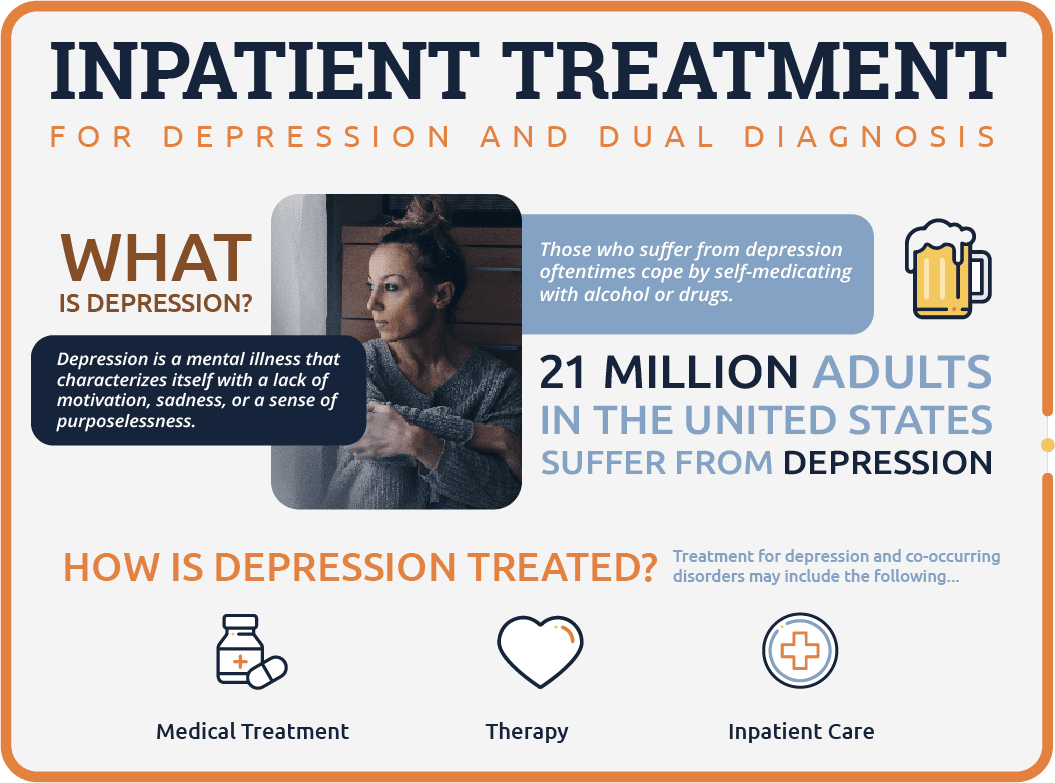Depression Recovery Centers in Northern Illinois


If you are seeking treatment for this mental health disorder and substance use disorder, know that we offer several behavioral health services to treat all types of mental health conditions that co-exist with addiction. You can discover both the cause and symptoms of your depression, and get the help you need to recover from substance abuse.
Jump to Section
Understanding Depression
Depression is an ongoing sense of sadness that you may feel regardless of the circumstances that surround you. Although an event can trigger depression, it does not have to be. Things can be going well, and yet you feel sad and hopeless inside.
Sadness and depression are related but distinct emotional states. Sadness is a normal human emotion that everyone experiences in response to adverse or disappointing events, such as the loss of a loved one, relationship problems, or failure. It is typically a temporary and natural reaction to specific circumstances.
Depression, on the other hand, is a mental health disorder characterized by persistent and pervasive feelings of sadness, hopelessness, and a lack of interest or pleasure in activities. Depression goes beyond just feeling sad and can significantly impact a person’s thoughts, emotions, behavior, and overall well-being. Some key differences between sadness and depression include:
- Duration: Sadness usually subsides over time as one comes to terms with the triggering event, while depression lingers for weeks, months, or even years without appropriate treatment.
- Intensity: Depression is more severe than sadness, often leading to a range of physical, emotional, and cognitive symptoms that interfere with daily functioning and quality of life. This could include self-harming behaviors or even lead to developing other mental health disorders.
- Cause: Sadness is generally triggered by a specific event or situation, whereas depression may arise without an apparent cause or due to a combination of genetic, biological, environmental, and psychological factors.
- Impact on daily life: While sadness can be painful and distressing, it generally does not disrupt one’s ability to carry out daily tasks, maintain relationships, or find enjoyment in life. In contrast, depression can significantly impair functioning in various aspects of life, including work, school, relationships, and self-care.
It is crucial to recognize the difference between sadness and depression because depression is a serious mental health issue that requires professional help from an accredited treatment center. If you or someone you know is experiencing symptoms of depression, it is essential to seek support from a mental health professional at a depression treatment center.
- Persistent feelings of sadness, emptiness, or hopelessness
- Loss of interest or pleasure in activities once enjoyed, including hobbies, socializing, and sex
- Irritability, frustration, or anger over minor matters
- Changes in appetite, leading to significant weight loss or gain
- Sleep disturbances, such as insomnia or oversleeping
- Fatigue, lack of energy, or feeling sluggish
- Feelings of worthlessness or excessive guilt
- Difficulty concentrating, making decisions, or remembering things
- Physical symptoms such as headaches, body aches, or digestive problems without a clear physical cause
- Slowed speech, movement, or thought processes
- Frequent thoughts of death, suicidal ideation, or suicide attempts
The causes of depression are complex and can involve a combination of genetic, biological, environmental, and psychological factors. It’s important to note that not everyone with depression experiences every symptom, and the severity and duration of symptoms may vary.
If you or someone you know is experiencing symptoms of depression, it’s crucial to seek professional help from a behavioral health professional, like a therapist or psychiatrist, for diagnosis and treatment. Treatment options for depression typically include individual therapy, group therapy, medication, and lifestyle changes, with the goal of alleviating symptoms and improving quality of life.
Depression and Addiction
When you have depression, you may have a difficult time getting through the low periods. As a result, you may have turned to alcohol or drugs to self-medicate and cope with your depression, which is why you may need depression and addiction treatment in Northern IL. Whether you use illicit drugs or suffer from prescription drug addiction, it is easy to form more and more of a dependency on the substance over time.
Some of the signs of addiction may include:
Your body builds a tolerance to alcohol and drugs. You need to take more so that you can feel the effect of the substance. Eventually, you will consume large amounts which can cause physical or psychological harm.
If you stop taking the drug, you will experience withdrawal symptoms, which can also include severe depression or anxiety. For this reason, you should seek help at a treatment center when going through drug and alcohol detox.
Depression can occur when you feel guilty each time you take the drug or drink too much alcohol. The substance may make you feel better, but when you come down off the high, you could go through a period of extreme low.
Relapse can occur if you deal with the addiction but do not address your depression. You could be clean for a few days. However, if you suddenly feel down again, you may turn to alcohol or drugs to relieve the depression.
What are the Types of Depression?
There are several types of depression, each with its unique characteristics. Some common types include:
This is the most common form of depression, characterized by persistent sadness, hopelessness, and loss of interest in activities. MDD can co-occur with addiction as individuals may turn to substances to self-medicate or cope with their depressive symptoms.
A milder but long-lasting form of depression that lasts for at least two years. People with dysthymia may also struggle with addiction, using substances to alleviate their chronic low mood or emotional numbness.
Formerly known as manic-depressive illness, this disorder involves episodes of depression and mania (extremely high energy and elevated mood). During depressive episodes, individuals with bipolar disorder might use substances to self-medicate, while during manic episodes, they may engage in risky behaviors, including substance abuse.
A type of depression that occurs during specific seasons, usually winter. SAD can co-occur with addiction, as people may turn to drugs or alcohol to cope with feelings of sadness, lethargy, and social withdrawal during the affected season.
A type of depression that affects some women after childbirth, marked by intense sadness, anxiety, and exhaustion. Women with postpartum depression may be at risk for developing substance use disorders, particularly if they use drugs or alcohol to cope with their symptoms.
A severe form of premenstrual syndrome (PMS) that causes significant emotional and physical symptoms before menstruation. Women with PMDD may use substances to manage mood swings, irritability, and other symptoms, increasing the risk of addiction.
A subtype of depression characterized by mood reactivity, increased appetite and sleep, and sensitivity to rejection. People with atypical depression may be more prone to addiction due to their sensitivity to emotional pain and attempts to self-medicate.
Co-occurring disorders develop because individuals with depression may use substances to escape or numb their emotional pain. Additionally, substance abuse can lead to changes in brain chemistry that contribute to major depression symptoms, creating a cycle of mental health problems and addiction. It is important for individuals struggling with both conditions to receive integrated treatment that addresses both depression and addiction simultaneously.
What Causes Depression to Develop?


Depression is a complex condition with multiple contributing factors. The exact cause of depression can vary among individuals, but it is generally believed to result from a combination of genetic, biological, environmental, and psychological factors. Some common contributors to depression include:
- Genetics: A family history of depression may increase the likelihood of developing the condition, suggesting a genetic predisposition.
- Brain chemistry: Imbalances in neurotransmitters (chemical messengers in the brain) like serotonin, dopamine, and norepinephrine are thought to play a role in depression.
- Hormonal imbalances: Changes in hormone levels, particularly during pregnancy, postpartum, menopause, or due to thyroid problems, can contribute to depression.
- Chronic medical conditions: Having a long-term illness, such as diabetes, heart disease, or cancer, can increase the risk of depression.
- Medications: Certain medications, including some blood pressure medications, sleeping pills, and hormonal treatments, can sometimes trigger depressive symptoms.
- Substance use disorders: Excessive use of alcohol or drugs can alter brain chemistry and lead to depression.
- Stressful life events: Significant life changes or stressors, such as the loss of a loved one, divorce, financial strain, or job loss, can trigger depression in some individuals.
- Early childhood trauma: Experiencing physical, sexual, or emotional abuse, neglect, or other traumatic events during childhood can make a person more vulnerable to depression later in life.
- Personality traits: Individuals with low self-esteem, a pessimistic outlook, or who are highly self-critical may be more prone to developing depression.
- Social isolation: Lack of social support or loneliness can contribute to feelings of depression.
It’s important to remember that depression is a multifaceted mental health disorder, and the specific causes may differ for each individual. If you suspect that you or someone you know may be experiencing depression, seek professional help from a mental health professional for proper diagnosis and treatment.


Dual Diagnosis Treatment for Depression and Substance Abuse


In dual diagnosis treatment, medications may be prescribed to manage both substance abuse and depression. Common medications for depression include:
- Selective Serotonin Reuptake Inhibitors (SSRIs) like fluoxetine (Prozac) and sertraline (Zoloft), which increase serotonin levels in the brain to improve mood.Serotonin-Norepinephrine
- Reuptake Inhibitors (SNRIs) such as venlafaxine (Effexor) and duloxetine (Cymbalta), which work by increasing both serotonin and norepinephrine levels.
- Tricyclic Antidepressants (TCAs) and Monoamine Oxidase Inhibitors (MAOIs) are older classes of antidepressants that may be used in some cases.
For substance use disorders, medications may include:
- Methadone or buprenorphine for opioid addiction, which help to reduce cravings and withdrawal symptoms.
- Naltrexone for alcohol or opioid addiction, which blocks the effects of these substances and reduces cravings.
- Disulfiram (Antabuse) for alcohol addiction, which causes unpleasant side effects if alcohol is consumed, discouraging its use.
Various therapies can help individuals overcome substance abuse and depression, including:
Cognitive Behavioral Therapy (CBT): This evidence-based therapy focuses on identifying and changing negative thought patterns, beliefs, and behaviors that contribute to depression and substance abuse.
Group Therapy: Participating in group therapy sessions can provide individuals with a supportive environment where they can share experiences, learn from others, and develop healthy coping strategies.
Mindfulness Practices: Techniques such as meditation, deep breathing, and progressive muscle relaxation can help individuals manage stress, reduce cravings, and improve overall mental well-being.
There are different forms of dual diagnosis treatment programs available, including:
Residential Addiction Treatment Illinois: At residential treatment centers you’ll receive 24/7 care and support, typically lasting between 30 to 90 days. Patients live in a structured environment with access to medical supervision, therapy, and medication management.
Partial Hospitalization Treatment (PHP): PHP offers intensive mental health and depression treatment for several hours a day in a hospital or clinic setting while allowing patients to return home in the evenings. This program can typically last from two to six weeks.
Outpatient Treatment: This flexible program involves attending therapy sessions at a treatment facility while living at home. It typically lasts for several months, depending on individual needs.
Each program has its unique environment and level of care. Inpatient treatment provides the most structured setting, while outpatient treatment allows for greater flexibility. Challenges faced in these programs may include managing withdrawal symptoms, developing new coping skills, and addressing any underlying issues contributing to the co-occurring disorders.
Learn More About Our Substance Abuse and Depression Treatment Plan


Northern Illinois Recovery Center offers comprehensive treatment for both depression and substance abuse through dual diagnosis treatment. We can diagnose the causes and symptoms of your depression while also assessing your addiction.
From there, we can help you develop Northern IL depression treatment programs that may include:
- Group therapy program
- Outpatient drug rehab center
- Medication-assisted treatment
- Cognitive-behavioral therapy
- Dialectical behavior therapy
- Trauma therapy program
To find out more about the depression treatment programs we offer, contact Northern Illinois Recovery Center today. Our licensed therapist can meet with you to go over your options and help you get the right treatment for your depression and addiction. Start your road to recovery today!
Get the help you need at Northern Illinois Recovery!
855.458.1739
Northern Illinois Recovery Resources


Licensed Physician and Surgeon
Dr. Beth Dunlap, a board-certified addiction medicine and family medicine physician, and is the medical director at Northern Illinois Recovery Center. She is responsible for overseeing all the integrated medical services at both campuses. Beth completed medical school, residency, and fellowship at Northwestern University, where she continues to serve on the faculty as a member of the Department of Family and Community Medicine. She has extensive experience in addiction medicine at all levels of care, and her clinical interests include integrated primary care and addiction medicine, harm reduction, and medication-assisted treatment.



